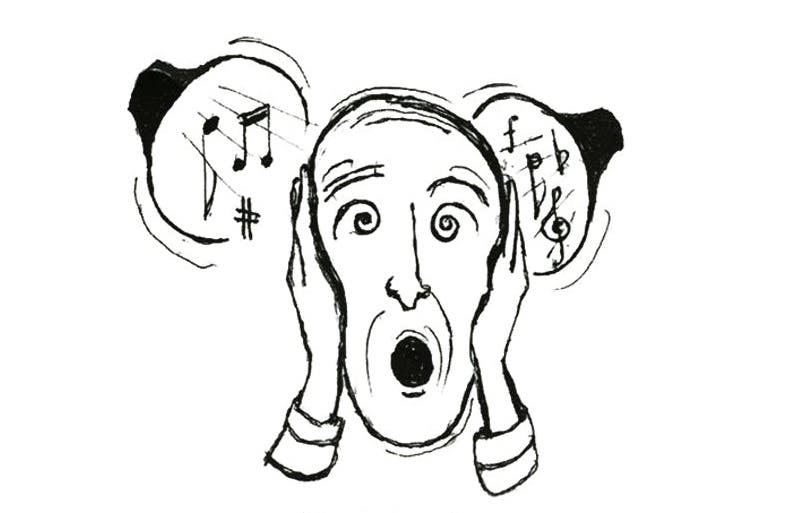I live with a ghost, or rather, I share an address with a man who’s been dead for many years. My house was his before I bought it, and such was the thoroughness with which he embedded himself in Royal Mail’s records that it’s impossible to remove him. Almost every letter I’m sent has his name on it; ‘Dr Dale Beckett?’ says each delivery man. I’ve called Royal Mail repeatedly to explain, but nothing doing. The doctor’s not for moving. And besides, I’m used to him now.
Dr Beckett gets my mail, but he also gets his own — each one a jigsaw piece of his former life. He was a psychiatrist, a gardener, a member of the society of hypnotists. On Saturday there on the doormat was another window into the doctor’s mind: a newsletter from Pipedown, the campaign for the freedom from piped music.
Pipedown has a distinguished set of patrons — Alfred Brendel, Philip Pullman, Tom Conti, Simon Rattle, Stephen Fry — and a pleasingly furtive font, so I took it to the breakfast table to read.
The assumption behind Pipedown is that throughout the 20th century and into the 21st there’s been a rising tide of background noise. Its real enemy is constant music — or Muzak as my parents called it back in the day — but any noise qualifies: sirens, planes, leaf blowers.
And if Pipedown’s to be believed, a really extraordinary amount of people find some form of everyday sound unbearable. At least 50 per cent of people would walk out of a shop with piped music, it claims, and when the train company c2c introduced screens into their carriages, passengers barricaded themselves in the toilet to escape them. Well, I would laugh — I did laugh — until it rang a bell.
Back in my travelling days, in my twenties, the rolling BBC news on the Heathrow Express sent me regularly into a rage. Just when you’d begun to daydream and anticipate escape, there was Evan Davies. And when, for an ill-advised few months, London’s black cabs had flatscreens, I avoided them. The Pipedown logo is a very satisfying drawing of a man at the end of his tether, clutching at his head. Its tagline: ‘You can close your eyes but you can’t close your ears.’ Quite.
On page three of the newsletter is the letters page (‘Positive and pertinent letters always welcome!’) — and there I find two, both written by a Gina Hazell. In the first she complains about constant TV in hospitals, and in the second she mentions that it’s strange that modern life is so noisy given that everybody wears headphones. If people like background music so much, asks Gina, why do they block it out?
And here’s where I had my Pipedown revelation: headphones aren’t incidental to the rising noise, they’re the cause of it. If the 21st century is really noisier than any other, it’s because it’s trying so hard to be heard.
I often pause on my way to work to read articles in a café in Covent Garden, and every time I wonder how other customers can stand the volume of the nonstop Ed Sheeran. I’ve thought: is this just being 40? But when I look around, almost everyone is wearing earphones. Of course train announcements are louder and longer, of course they’re endlessly repeated (dread phrase: ‘Once again…’). It’s all just an attempt to get through.
I read recently that British songbirds have started singing late at night because the daytime traffic drowns them out — and it’s true, I heard a robin at 8.30 in the evening last week. The dawn chorus begins earlier around major airports in the lull before the flights begin; whales sing louder in shipping lanes; and just as nature evolves to cope with noise, so I reckon the noise has evolved to cope with headphones. I’ve seen teens on bikes carrying speakers on top volume in their rucksacks. They don’t just want to listen to music — they want to be heard.
Pipedown regulars will be familiar with its campaign for a red button on the TV remote to mute ‘intrusive and often inappropriate music’. For some reason, says Pipedown, this is particularly bad on wildlife programmes. NB, it adds in bold, all sound including ‘natural noises’ is dubbed in later.
Does Pipedown suspect conspiracy? I suspect that programme editors are all too aware of a viewer’s fractured attention, split between big screen and touchscreen. Were I to write to Pipedown (and I might), I’d point out that the incongruous intensity of some TV music can be funny. You’d think from the Masterchef soundtrack that the contestants who fail a round had been given a terminal diagnosis.
Last Wednesday in the Guardian, there was a strange story about a mysterious ‘hum’ that millions of people in urban areas around the world all claim to hear. Every person who hears it has a different explanation — industrial machinery, high-speed traffic, propellers, aliens — and all strongly resist the idea that the noise is psychosomatic or in any way inside their heads. Well, there’s a home for people persecuted by the worldwide hum. Pipedown is a broad church.
I sat in my kitchen that Saturday, surrounded by hectoring voices. ‘That’ll be three coins — and don’t forget to eat your greens!’ said my three-year-old’s talking till. ‘So many channels, so little time!’ sang his toy remote. I could feel the spectral presence of Dr Beckett smiling.







Comments